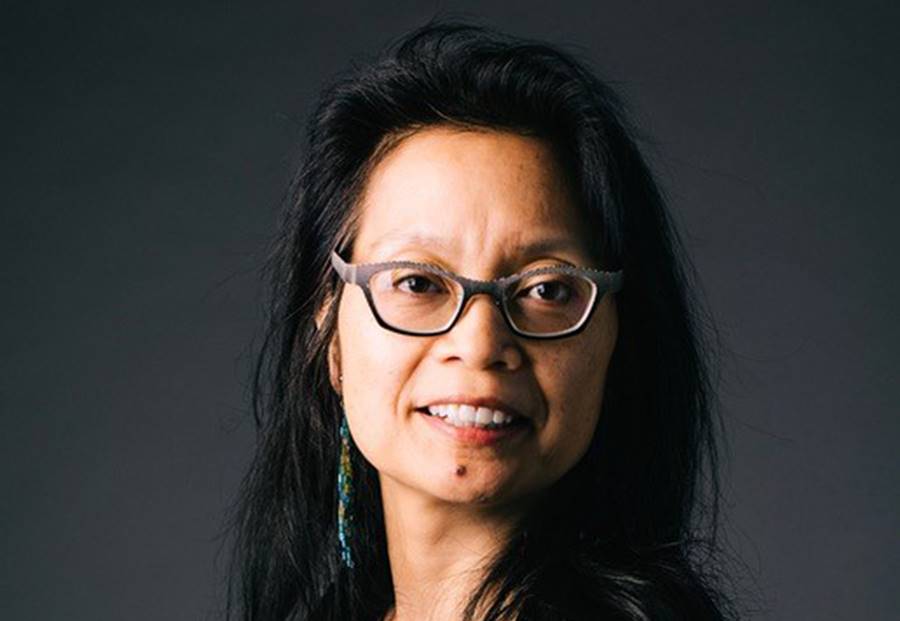
Jae-Ha Kim
Chicago Tribune
May 24, 2022
Growing up in rural Minnesota, novelist Marie Myung-Ok Lee wasn’t expecting much in terms of learning a foreign language. “Now when I think of it, I am astonished we had two languages we could take – Spanish and German,” said Lee, who teaches fiction at Columbia University in New York. “I took four years of German, which was pretty rigorous. I took French for two years (in college) and spent a summer studying in Paris. I also spent a year in Korea as a Fulbright fellow and took intensive Korean classes so I could take oral histories. Now I speak a bunch of languages half way and mix them all up.”
Her linguistic skills and travels play a prominent role in her latest novel “The Evening Hero” (Simon & Schuster, $28.99), which centers on a septuagenarian doctor whose past in Korea threatens to upend his perfect American life. This interview was conducted while Lee, who resides in New York with her husband and son, was on her book tour.
Q: How have your travels informed your writing?
A: I am a hands-on researcher for my novels and part of (“The Evening Hero”) is about a region in Korea that would become the Demilitarized Zone – where Koreans gave themselves a break from the war and just hung out. Soldiers from both sides – many of whom were just kids – would even play jegichagi (kicking shuttlecock). I had an opportunity as a faculty member at Brown (University) to accompany some students who’d managed to find a Chinese agency that would arrange an academic trip to North Korea. The Exchange Zone as I call it in the novel is based on a real place. It was wonderful to compare it with the place in my imagination.
Q: This pandemic has made everyone think differently about how we spend our free time. How did you spend it?
A: For the first three months in New York City, we didn’t even know if you could catch COVID by going outside, so we stayed inside! When we slowly started venturing outside to a nearby park, it was like everyone came out at the same time at around four to five when (remote) school and work ended. It was funny seeing the same people every day. We did circumnavigate our neighborhood. Being able to walk in the middle of the street gave one a new vantage point that made everything new. I did also take off one day and rode to Koreatown on my bike through the deserted streets. It was wild and cool and unsettling all at the same time.
Q: If you had to cancel travel plans due to the pandemic, where were they to?
A: I was supposed to go to the Vermont Studio Center in Johnson, Vermont, to work on my novel. The weird thing was I was supposed to leave March 14 (2020). On March 13 they were asking me what time I’d be getting in. (Then) everything was shut down.
Q: Do you have any untapped destinations you’d like to talk about?
A: I’d like to see Alaska before the landscape there melts. (And) there’s so much more of Asia I’d like to see.
Q: What was the first trip you took as a child?
A: We flew from Minnesota to California to visit the couple who sort of fostered my parents when they first came to America. It was not a great trip for me. We went to visit the wife at a senior home and the lady in the next bed died while we were there. I was three or four and it was pretty traumatizing.
Q: Where have you traveled to that most reminded you of home?
A: Seoul actually reminds me of New York because you can get anything you want at any hour. I was just in Kalamazoo for a book event and that reminded me a little of Hibbing, where I grew up in Minnesota – but because of the depressed, post-industrial vibe.
Q: What is your best and/or worst vacation memory?
A: I don’t think this is the worst per se but it’s the same memory bookended. When I was studying in Paris as a college student, my parents came to visit. I was so excited to show off my knowledge of restaurants. My late father was a fan of fine dining. I looked at everything from the famous La Tour d’Argent to restaurants in the Eiffel Tower. But oddly and disappointingly, my father told me to find a Korean restaurant. Who spends one of their days in Paris at a Korean restaurant? I searched, half hoping there wouldn’t be one. But wouldn’t you know it? There was a Korean barbecue place. I don’t remember anything about the food. But this was before I spoke Korean or knew that much about Korean culture. After traveling for a few weeks in Europe, my father was craving kimchi. Now I see the memory as kind of cool that he had to have his kimchi, even in Paris.
© 2022 JAE-HA KIM
DISTRIBUTED BY TRIBUNE CONTENT AGENCY, LLC.

Your relating your father’s preference for kimchi while in Paris reminds me of my dear wife (recently deceased), Ann Kim, who emigrated to the States at age 17. I studied in Rome prior to entering the Army; then served two tours in Italy. I married Ann later after retirement. Italy is my second home, and I’ve wanted to revisit as often as possible. Ann and I went there four or five times. The first time she went along reluctantly with Italian fare. We did find one Korean restaurant, though, in Rome. From then on, every time, she’d bring some kimchi with her and we’d have to look for as many Korean shops as we could find. I miss her dearly. Thanks for the memory.
Frank, thank you for sharing your beautiful memories. I will be sure to pass your comment along to Marie.
I remember being in Scandinavia for the first time and finding a Korean restaurant in Norway many MANY years ago. It wasn’t very good — the food was very bland to suit the locals’ tastes (at that time). But the owner was so happy to see another Korean who he could converse with in his native language that he stood nearby. This made my friend very uncomfortable and she said to me, “Tell him to go away.” I most certainly did not.
Dear Frank,
Thank you so much for sharing your beautiful memories. Haha I get your wife–I was last week teaching in Seaside Florida, total tourist trap and managed to find some kimchi–and surprisingly good. My roommates came in to find me eating this (w potato chips) and I offered to share–they declined https://www.instagram.com/p/Cdj3p-eFWyU/